Estate planning cases aren’t small wins — a single high-net-worth client can bring in $10,000 to $25,000+. But if your firm isn’t showing up online, you’re handing that revenue to a competitor.
The demand is undeniable: 68% of Americans still don’t have a will, and many are actively seeking estate planning and trust litigation help on Google. The law firms that rank, advertise, and engage are geared to receive a massive flood of clients in 2025.
Just look at Barr & Douds, a top-tier trust and estate litigation firm. We helped them grow in one of the most competitive markets in Northern California, and they saw a:
- 937% increase in qualified leads
- 87% decrease in cost per lead
- 4,774% surge in organic traffic
This guide breaks down the 16 estate planning tactics we used to deliver those results so that you, too, can attract your ideal clients, week after week, month after month.

1. Build Your Ideal Client Profile
The estate planning industry is fiercely competitive, with well over 200,000 estate lawyers in the U.S. as of 2025. Standing out is harder than ever.
If you try to market to everyone, you’ll convert no one. The fastest way to grow your estate planning practice? Nail down your ideal client profile, and speak directly to them.
Remember, estate planning services aren’t one-size-fits-all, which is why it’s essential to build a clear ideal client profile for your law firm. This makes it easier to tailor every message, offer, and estate planning strategy with precision.
Start by identifying your key client demographics:
- Age (often 35–65+), income level, location, homeownership status, marital/family status.
- Psychographics: What are their fears or motivations? Common concerns include avoiding probate, minimizing taxes, or ensuring a legacy for their children.
- Search behavior: Do they rely on referrals? Are they researching online? Are they detail-oriented or looking for peace of mind?

With this, you can craft a client persona that drives every campaign, landing page, and blog post.
Bonus Tip: Want to attract more clients, not just traffic? Check out our complete digital marketing guide!
2. Build a ‘Client-First’ Estate Marketing Strategy
Throwing spaghetti at the wall doesn’t work in law firm marketing, especially in estate planning, where trust and timing are everything.
Stop relying on more referrals to run your law firm. A smart, structured marketing plan encapsulates a multi-channel approach to attract new leads:
- Clarify your goals: Do you want more clients? Bigger retainers? Better leads? Start with the outcome, then reverse-engineer your plan.
- Choose your channels: A winning strategy development process often includes SEO, PPC, content marketing, email, and social media.
- Align your efforts: Make sure all your marketing materials; every blog post, ad, or email works together (not in silos) to create a consistent client journey.
According to Clio’s 2025 Legal Trends Report, firms that use a strong, multichannel law firm marketing strategy grow their revenue 135% faster than those that don’t.
Tired of wasting money on random marketing tactics? Read our Law Firm Marketing Playbook that serious firms are using to dominate Google search in 2025.
3. Climb the Rankings Ladder and Get Found with SEO
If your estate planning firm doesn’t show up on page one of Google, no one’s seeing your website. Period.
Search engine optimization (SEO) is how you get found by people actively looking for your services, and avoid handing those leads to the firm down the street.
Here’s what SEO for estate planning lawyers must do:
- Target the right keywords: Use tools like Ubersuggest or Ahrefs to identify phrases like “estate planning attorney in [city]” or “living trust lawyer near me” with a decent search volume.
- Create helpful content: Blog posts that answer client questions (“Do I need a will if I have a trust?”) increase organic traffic and build trust.
- Optimize technical elements: Page speed, mobile responsiveness, internal linking, and proper headings all boost your search rankings.
BrightEdge reports that 53% of website traffic comes from organic search, and those visitors are far more likely to convert.
Need proof that SEO works for estate planning? We helped Brandon White Law, a Phoenix-based firm, achieve a 4,020% increase in organic traffic, despite fierce competition. With SEO-rich content and a conversion-driven website, their cost per lead dropped by 25%, setting the stage for long-term success.
Still fuzzy on how SEO works for law firms? Get all your questions answered in our Law Firm SEO FAQ guide!
Or, if you’d like to talk to an expert… Book a free 15-minute strategy call and let’s grow your estate planning firm together.
4. Capture Clicks Fast with Pay-Per-Click (PPC) Ads
Want to show up instantly at the top of the page when someone searches “estate planning lawyer near me”? That’s where PPC comes in.
With paid advertising like Google Ads, you can appear at the top of search results for high-intent keywords, even before your SEO efforts kick in.
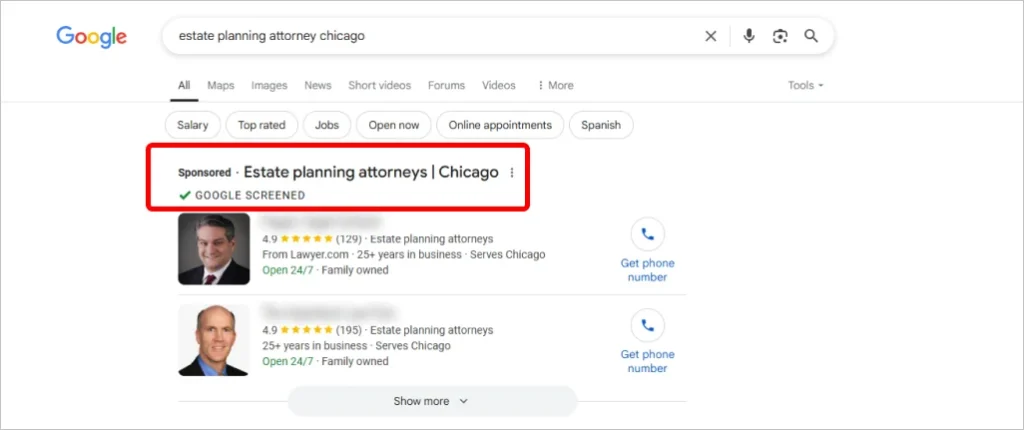
PPC is a great add-on to your comprehensive plan because it offers:
- Immediate visibility: No waiting months for rankings. You can launch today and start getting leads much quicker.
- Keyword control: Bid on terms like “trust attorney in [city]” or “living will lawyer,” and filter by location, age, income, and more.
- Budget flexibility: With proper targeting, your Google Ads can drive strong ROI even with a modest budget.
The average legal industry PPC conversion rate is around 6.98%, according to Wordstream. And that jumps higher when ads are paired with landing pages tailored to your practice.
Keep in mind that PPC helps you show up for high-value prospects right when they’re ready to hire.
Targeted ads are a great tactic to get more clients… but only if done right. Check out our guide on launching an ROI-first PPC campaign for estate attorneys.
5. Convert Local Clients with a Google Business Profile
When someone searches “estate planning attorney near me,” Google pulls local listings first — often before paid or organic results. If your business listing isn’t optimized, you’re missing calls, clicks, and cases.
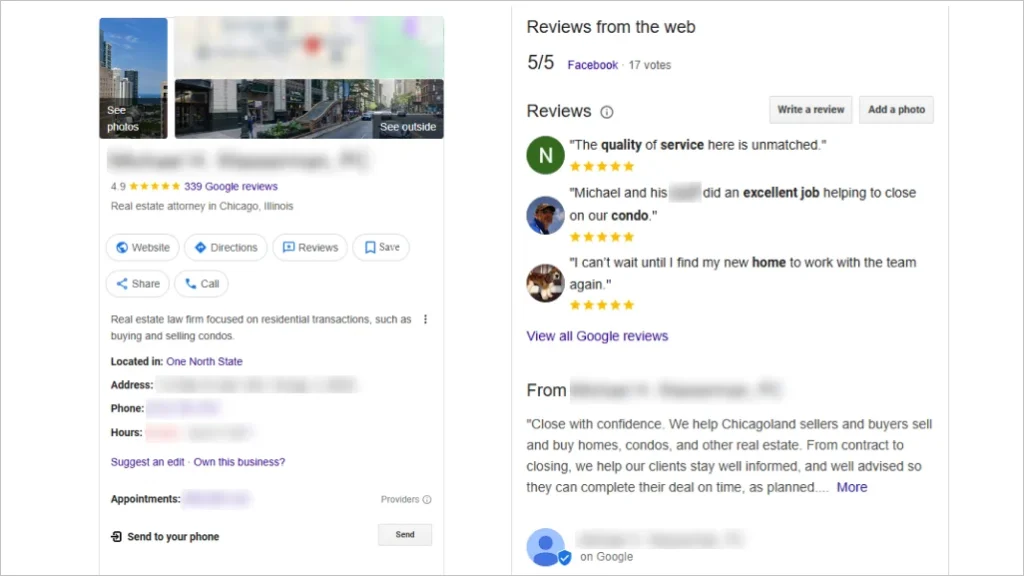
How to level up your online presence:
- Claim and verify your profile via Google.
- Fill out every field — hours, services, address, photos, FAQs, and a compelling firm description.
- Add keywords naturally like “estate planning lawyer in [city]” or “living trust attorney.”
Google suggests that 76% of people who search for something locally visit a business within 24 hours, and 28% make a purchase.
For law firms, that can mean consultations booked the same day. It’s one of the highest-ROI tactics in SEO, and it’s free!
6. Design a Website That Converts (Not Just Looks Pretty)
Don’t just build a website. Build a client-conversion engine.
An outdated or confusing site creates friction and loses leads fast. In fact, 75% of users judge a firm’s credibility based on website design (Stanford Web Credibility Project).
To attract and convert estate planning clients, your law firm website needs to be:
- Fast: Pages should load in under 3 seconds, especially on mobile.
- Responsive: Over 60% of legal searches happen on phones. Your site must work flawlessly across devices.
- Clear: CTAs like “Schedule a Free Consultation” should be easy to find and click.
Your website design should also reflect the emotional nature of estate planning — calm, trustworthy, and professional. Highlight your services, showcase testimonials, and even use video marketing to retain visitors.
AI Tip: AI tools like Hotjar or Microsoft Clarity use heatmaps and behavior analytics to show exactly where visitors drop off, helping you fix weak points in your user experience.
Need a little inspiration? Check out the 60 best law firm websites of 2025. These are handpicked examples that combine sleek design, smart UX, and marketing that drives results.
7. Win Them Over with Excellent Content
When it comes to estate planning marketing, clients want valuable information before they commit. That’s where content marketing shines.
Informative, value-packed blogging positions your firm as a trusted authority while quietly doing the heavy lifting of lead generation. Here’s how to do it right:
- Answer real client questions: “What’s the difference between a will and a trust?” or “Do I need an estate plan if I’m under 40?”
- Target local phrases: Create legal content that ranks for keywords like “estate planning lawyer in [your city]” or “how probate works in [your state].”
- Add personality: Share stories, case studies, or even FAQs that reflect your firm’s voice.
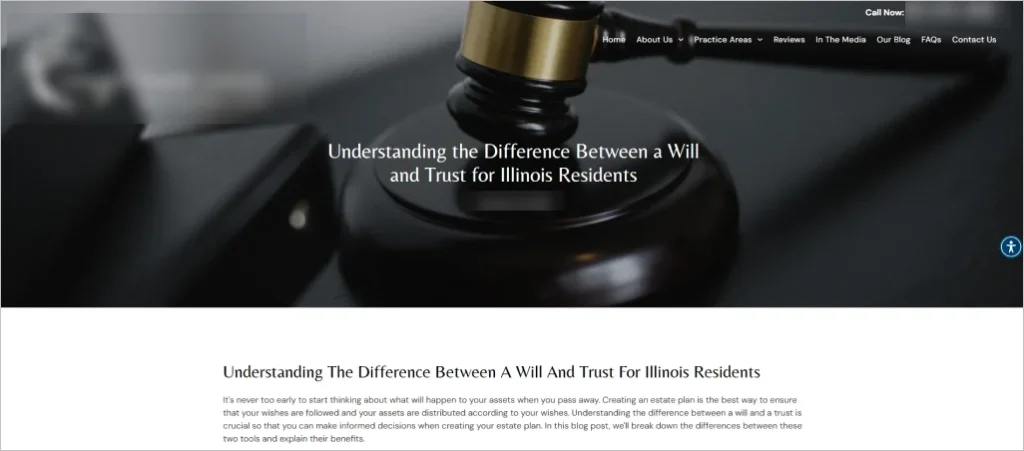
According to Demand Metric, content marketing generates 3x more leads than traditional outbound marketing at 62% less cost.
AI Tip: Use ChatGPT to outline or draft first-pass blog posts, FAQs, or checklists. Then refine it with your expertise.
Want to leverage your content to attract quality leads? Check out our 2025 Content Marketing Guide for Law Firms today.
8. Stay Top-of-Mind with an Email Marketing Plan
Most estate planning prospects don’t hire after one click, but many will over time. That’s why email marketing is a must.
A smart nurture sequence keeps your firm top-of-mind while building trust, credibility, and urgency. Here’s what to include:
- Lead magnet → Welcome email: Offer a free guide (e.g., “7 Estate Planning Mistakes to Avoid”), then follow up with value-rich insights.
- Follow-up drip: Send 3 to 5 emails over a few weeks covering topics like probate, guardianship, or asset protection.
- Client stories: Include short testimonials or success stories that build emotional trust.
Email is also a powerful way to maintain client communication. You can remind leads about expiring wills, invite them to webinars, or share updates on estate law.
AI Tip: To make this process easier, platforms like Mailchimp and ActiveCampaign now use AI to recommend send times, segment audiences automatically, and even write subject lines that boost open rates. Make the most of this.
Is the effort worth it? Absolutely! According to HubSpot, email generates $42 for every $1 spent, making it one of the most cost-effective marketing tools.
9. Leverage Referrals to Fill Your Client Pipeline
In estate planning, some of your best clients won’t find you through Google — they’ll come from someone they already trust. That’s why building a referral network is essential.
Here’s who to connect with:
- Financial professionals: Financial institutions have clients who often need estate plans, trusts, or asset protection.
- Accountants: Tax strategies and estate planning go hand-in-hand, especially with high-net-worth clients.
- Other attorneys: Real estate, family law, or business lawyers can refer clients needing wills or trusts.
Offer value first, whether it’s a guest article, a co-hosted seminar, or just a helpful resource.
According to Nielsen, 92% of people trust referrals from individuals they know. That trust transfers to you. When you nurture real relationships, your marketing gets a serious boost without having to spend any money.
10. Use Testimonials to Let Your Happy Clients Sell for You
Social proof matters. Before hiring an attorney, potential clients want to know: Can I trust you? Will you deliver? Strong client testimonials and reviews answer those questions.
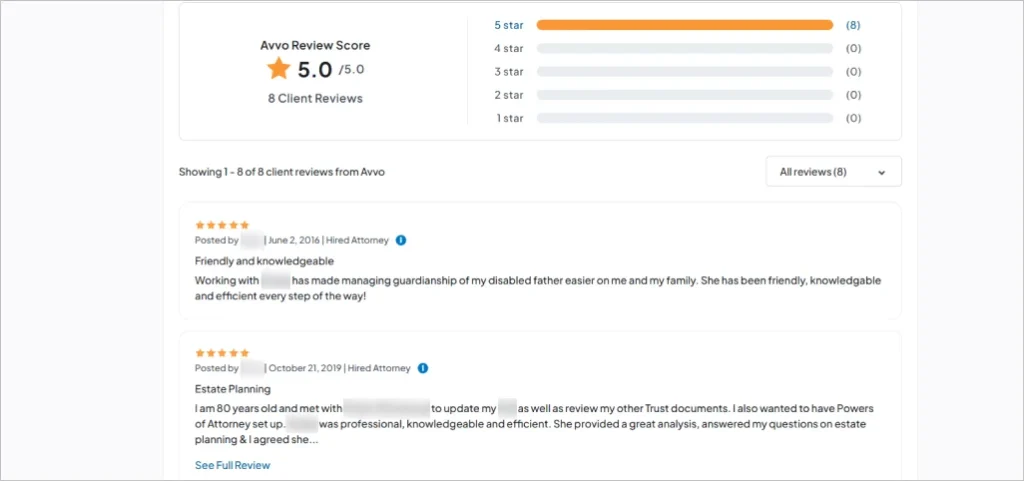
Here’s how to make them count:
- Ask right after a win: When a current client thanks you, ask if they’d share their experience in a review.
- Make it easy: Send them a direct link to Google, Yelp, or Avvo — wherever your target audience is likely to look.
- Showcase variety: Highlight stories from different types of clients (young parents, retirees, business owners) to attract new business.
The bottom line? Positive feedback builds your credibility, strengthens conversion rates, and gives potential clients the confidence to choose you. Think of every glowing review as a mini billboard, one that works 24/7 with no extra spend.
11. Own the Room with Educational Events and Seminars
You don’t need a commercial to get attention — you just need a microphone and a message.
Hosting educational workshops and seminars is one of the most powerful ways to inspire confidence in your local community. People get to know you before they need you.
Here are some event ideas for estate planning attorneys:
- “Estate Planning 101” workshops for first-time parents
- Seminars on trusts, probate, or power of attorney
- Joint events with CPAs or financial planners
Add a Q&A, record the session, and offer a free consultation to attendees. This positions you as a helpful guide and not just another sales pitch.
Pro Tip: Share event recaps on social media or email to double the exposure. By investing in your local community, you build relationships that last.
12. Show Up On Social Media to Inch Past Other Lawyers
Most estate planning firms treat social media like an afterthought, presenting a major opportunity for your estate planning firm.
Think of social media marketing as an opportunity to establish trust and relevance where your future clients already spend their time:
- Facebook: Great for local targeting and community outreach. Share client success stories, FAQs, or invite followers to webinars.
- LinkedIn: Perfect for connecting with professionals, referral partners, and showcasing thought leadership.
- Twitter (X): Share timely updates, legal changes, or live commentary on estate planning trends.

According to ABA research, 84% of firms with a social media presence gain clients through it, and for solo or small firms, that number is even higher.
Effective online engagement keeps your firm top of mind and humanizes your brand. If you’re not showing up on social media, you’re missing chances every day to inspire confidence in your brand — one post at a time.
On that note, check out these 8 social media strategies for lawyers to learn where to show up and how to stand out.
13. Track What Works (So You Can Do More of It)
If you’re not tracking your results, you’re flying blind. Smart estate planning law firms use marketing metrics to double down on what works (and cut what doesn’t).
Here’s what to measure:
- Traffic-to-lead ratio: How many visitors actually turn into inquiries? A high bounce rate with low leads = wrong traffic or weak messaging.
- Cost per qualified lead (CPL): How much are you spending to acquire a lead who’s actually a potential prospect?
- Channel-specific conversion rates: Don’t just track sources — compare how well Google Ads, SEO, or referrals convert into real consultations.
- Call tracking data: Use tools like CallRail to see which campaigns drive phone calls, and how long those calls last.
- Form abandonment rate: Are users starting but not completing contact forms? That signals friction you can fix.
Firms that review their metrics regularly are 2x more likely to hit their growth goals.
And with better performance tracking, you can improve ROI, streamline spending, and make smarter decisions across the board.
AI Tip: Use AI-powered dashboards like AgencyAnalytics or Zoho Analytics to visualize your campaign performance and predict future trends based on historical data.
14. Offer Value with Free Resources (Clients Love This)
Free resources like checklists, guides, and planning templates are powerful lead magnets to capture people’s contact information. Here’s what works:
- “5 Estate Planning Documents Every Parent Needs”
- “Living Trust vs. Will: What’s Right for You?” eBook
- “End-of-Life Planning Checklist” (great for older clients)
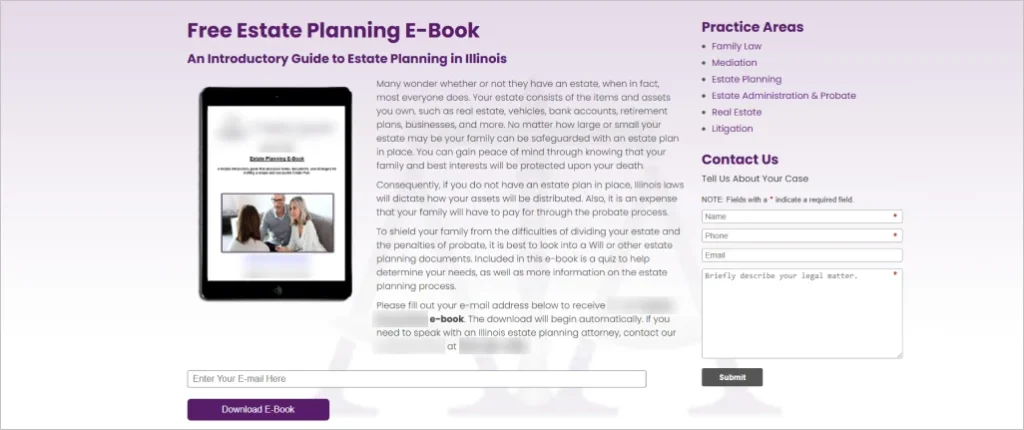
According to Content Marketing Institute, 66% of marketers say free resources bring in high-quality leads, and legal services are no exception.
These downloadable content pieces let potential clients experience your expertise before booking a consultation, and they position you as a helpful, trustworthy expert.
Pair each offer with a simple landing page and email opt-in. From there, you can nurture leads with follow-ups, reminders, and additional content.
Remember, if you want more leads, start by offering free value directly targeting their estate planning needs.
15. Ditch Generic Messaging — Personalize Every Client Touchpoint
Estate planning is deeply personal, and your marketing should reflect that.
Instead of sending cookie-cutter messages, use personalized communication to connect with your audience based on their needs, life stage, and goals. Here’s how to do it:
- Segment your list: Group leads into categories like new parents, retirees, or business owners. Each group has different concerns, so tailor your content accordingly.
- Use merge tags: Personalize emails with names, locations, or relevant legal topics based on previous interactions.
- Trigger behavior-based content: If someone downloads a guide on trusts, follow up with content about funding a living trust.
This extra effort is worth it because personalized marketing drives way more qualified leads. The proof: 80% of consumers are more likely to do business with a brand that offers personalized experiences!
16. Let Client Feedback Shape a Smarter, Stronger Firm
Want to improve your marketing and your service delivery? Start by listening.
Collect and act on client feedback to boost satisfaction, improve your processes, and sharpen your message. Here’s how to build an excellent feedback loop:
- Send short surveys post-engagement: Ask about their experience, why they chose you, and what could’ve gone better.
- Use reviews as a mirror: Positive ones reveal what to double down on; negative ones uncover blind spots.
- Turn insights into action: If existing clients say your estate planning process is confusing, fix it. If they love your responsiveness, highlight that in your messaging.
This isn’t just about reputation — it’s about continuous service improvement that feeds your growth.
According to SurveyMonkey, 72% of customers will share a positive experience with six or more people, and unhappy ones will tell even more. So take this seriously and remember, when your clients feel heard, your law firm will get sharper with every interaction.
Too Busy To Chase Leads? Let Us Fill Your Pipeline.
You didn’t go to law school to write blog posts or manage Google Ads. You built your law firm to help families protect their legacies.
But right now, potential new clients who need your expertise are choosing another lawyer — simply because you’re not showing up online.
At Comrade Digital Marketing, we help estate planning lawyers like you attract more qualified clients without the hassle. Our proven SEO, PPC, web design, and content strategies create a reliable pipeline so you can experience:
- Up to 10x more high-intent leads from your local area
- A full calendar with the right kind of clients, week after week
- Up to 400% to 800% ROI on your marketing budget
Grow with ease and get clients faster. Book your free consultation today.

Your no-obligation free Growth Plan:✔ Analyzes your website & SEO performance
✔ Identifies missed opportunities for leads
✔ Builds a roadmap to increase your ranking & conversions
